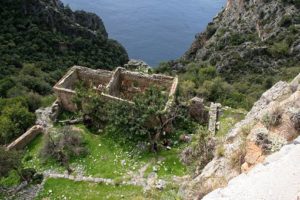Readings: Psalm 125; 2 Kings 2:9-22 (23-25); Acts 3:17-4:4
Now the people of the city said to Elisha, “The location is good…but the water is bad and the land unfruitful…then he went to the spring of water and threw the salt into it, and said, “Thus says the Lord, I have made this water wholesome; from now on neither death nor miscarriage shall come from it.” So the water has been wholesome to this day, according to the word Elisha spoke.
Elijah has been taken up into the heavens, leaving Elisha to pick up his prophet’s mantle. He is a true prophet, having the power to do mighty things in the name of the Lord. Putting grief aside, he manages to cleanse a spring of water – an act that saves the people from illness and death. Prophecy and help don’t die with Elijah because God continues to provide for the people through Elisha. God’s power has passed into new hands. That’s where the story ends when it’s heard in church or listed in daily devotionals, but it’s not the end of the story as written:
He went up from there to Bethel; and while he was going up on the way, some small boys came out of the city and jeered at him, saying, “Go away, baldhead! Go away, baldhead!” When he turned and saw them, he cursed them in the name of the Lord. Then two she-bears came out of the woods and mauled forty-two of the boys. From there he went on to Mount Carmel, and then returned to Samaria. 2 Kings 2:19, 21, 23-25 NRSV
As our weary and grieving prophet heads out of town, a pack of small boys runs alongside, shouting insults and taunting Elisha. Elisha snaps, turning his grief, exhaustion, and annoyance into a curse that leaves dozens of young boys injured and dying. He keeps walking, leaving behind life-giving water and heartbroken families. Human frailty and great power can harm just as easily as it can heal.
Perhaps this is why God-With-Us came to Mary and Joseph – a young woman willing to risk everything to serve God and a man kind enough to refrain from harming her even when he thought she had been unfaithful. God knew they would love him and teach him to act with compassion. For Mary and Joseph were so loving that God gave them his only begotten son…
Come, walk with me to Bethlehem.


